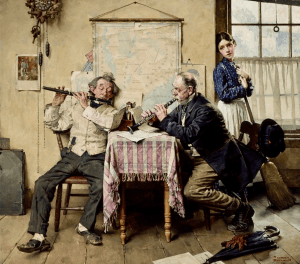We support our Publishers and Content Creators. You can view this story on their website by CLICKING HERE.
Americans turned to the concrete lessons of history and experience to guide them in securing their liberty. The French, on the other hand, deified Reason above not only experience, but also above religion and divine revelation.
One of the many differences between the American and French Revolutions is that, unlike the French, Americans did not fight for an abstraction. Americans initially took up arms against the British to defend and preserve the traditional rights of Englishmen. The slogan “no taxation without representation” aptly summed up one of their chief complaints. The right to not be taxed without the consent of your elected representatives was one of the most prized rights of Englishmen. When this became impossible to achieve within the British Empire, Americans declared their independence and then won it on the battlefield. That is, Americans fought for tangible goals; they fought to preserve their traditional rights rather than to overturn an established social order. Ours was a revolution more about home rule than about who should rule at home.
However, the French Revolution was about who should rule at home. They fought for “liberty, equality, and fraternity.” Neither equality nor fraternity can be achieved through force by the state. Perfect equality is elusive and, even if it could be achieved, would be inconsistent with liberty. Whereas Americans struggled for tangible goals, the French took on the Sisyphean task of striving for abstractions.
Yes, the second paragraph of the American Declaration of Independence deals in abstractions and universal truths. However, it is important to keep in mind the Declaration’s historical context. The signers of the Declaration did not think they were establishing a national government or founding a national Union when they signed it. There is not one shred of evidence in the historical record that they believed they had found either a national government or a permanent Union upon the Declaration’s self-evident truths. They understood that they were signing their names to a document that simply explained why it had become “necessary for one people to dissolve the political bands which have connected them with another” and that declared “the causes which impel them to the separation.” The Declaration was a document of dissolution. That is, it de-founded an empire, it did not found a new one. In the Declaration, thirteen constitutional political societies declared why it had become necessary for them to sever the political bands which had connected them to England.
After winning their independence, Americans turned to the concrete lessons of history and experience to guide them in securing their liberty by establishing government on a solid foundation. “Experience must be our only guide,” John Dickinson reminded his colleagues at the Philadelphia Convention. “Reason may mislead us.”[1] They sought not to create something new under the sun. Human reason, they knew, was fallible. Reason alone, unguided by history and experience, was likely to lead one into wild abstractions and the creation of an unstable government. Under such a government, novel and untested, liberty would not be secure. The only safe path forward was to look to history and allow experience to guide their reason.
Experience was “the best oracle of wisdom” and “the least fallible guide of human opinions,” wrote Alexander Hamilton in The Federalist.[2] James Madison, his collaborator, concurred. Experience was “the oracle of truth” and “the guide that ought always to be followed whenever it can be found,” wrote Madison.[3] Experience would help prevent reason from leading them astray.
The French, on the other hand, deified Reason above not only experience, but also above religion and divine revelation. Indeed, they even transformed Notre Dame into a Temple of Reason and held pseudo-religious festivals in honor of this new deity. Reason unrestrained and unguided by history and experience proved unable to establish a stable government or to secure liberty in France. Instead, it led them to descend into the Terror, the reign of Napoleon, and, ultimately, to the restoration of the monarchy.
Wendell Berry was right about abstraction: “abstraction is the enemy wherever it is found.”[4] Let us turn instead, as America’s Founders did, to experience. “That experience is the parent of wisdom,” explained Hamilton, “is an adage, the truth of which is recognized by the wisest as well as the simplest of mankind.”[5]
This essay was first published here in September 2013.
The Imaginative Conservative applies the principle of appreciation to the discussion of culture and politics—we approach dialogue with magnanimity rather than with mere civility. Will you help us remain a refreshing oasis in the increasingly contentious arena of modern discourse? Please consider donating now.
Notes:
[1] Quoted in Forrest McDonald, Novus Ordo Seclorum: The Intellectual Origins of the Constitution (Lawrence, KS: The University Press of Kansas, 1985), 7.
[2] Alexander Hamilton, “Number 15” and “Number 6,” in The Federalist, ed. by George W. Carey and James McClellan (Indianapolis: Liberty Fund, Inc., 2001), 73, 23.
[3] James Madison, “Number 20” and “Number 52,” in The Federalist, 99, 273.
[4] Wendell Berry, “Out of Your Car, Off Your Horse,” in Sex, Economy, Freedom & Community (New York: Pantheon Books, 1993), 23.
[5] Hamilton, “Number 72,” in The Federalist, 376.
The featured image is courtesy of Pixabay.
Share This Story, Choose Your Platform!
Go to Top

 Conservative
Conservative  Search
Search Trending
Trending Current News
Current News 







